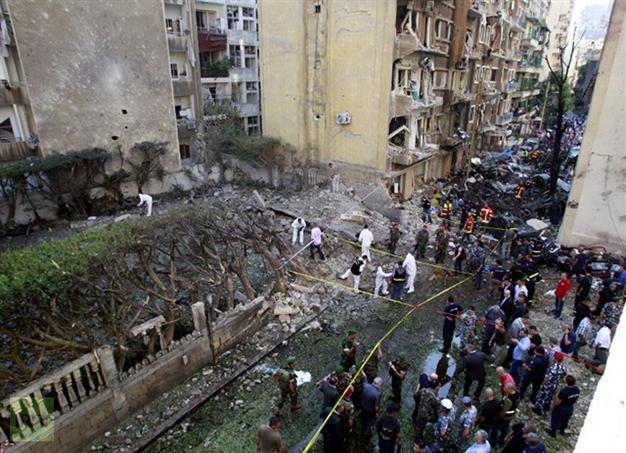
AFP Photo
Lebanon was reeling on Saturday after a deadly car bomb attack in Beirut linked to the conflict ravaging neighbouring Syria that threatens to tear apart its fragile political system.
The authorities have called a day of national mourning for those killed in Friday's powerful explosion during rush-hour in Ashrafieh, a predominantly Christian district of the Lebanese capital.
Officials said internal intelligence chief General Wissam al-Hassan was among the eight dead -- in one of the highest-profile killings since the 2005 assassination of prime minister Rafiq Hariri. Another 86 were wounded.
The Red Cross put the toll at four dead and number hurt at 110.
"This is not the final toll, as we still need to see what happens to the critically wounded," Red Cross spokesman Ayad Mounzer told AFP.
The Lebanese cabinet held an emergency meeting on Saturday morning to discuss the fallout from the bombing, after key opposition groups had called on the government to step down.
"The government must leave and we call on Prime Minister Najib Mikati to resign immediately," Ahmad Hariri, secretary-general of the Future movement, said on Friday night.
Hassan was close to Hariri's son, Saad, who is an opposition leader and hostile to the regime of Syrian President Bashar al-Assad.
Mikati's office said on Saturday the "size and tragic consequences of this heinous crime is a source of severe pain and sadness to the prime minister", and would be the focus of the cabinet meeting.
Syrian Information Minister Omran al-Zohbi condemned what he called a "terrorist, cowardly" attack.
But both Saad Hariri and Walid Jumblatt, Lebanon's Druze leader, accused the Syrian president of being behind the bombing.
"We accuse Bashar al-Assad of the assassination of Wissam al-Hassan, the guarantor of the security of the Lebanese," Hariri, also a former premier, told a Lebanese TV station.
"The Syrian regime is expert in political assassinations," he told AFP. "Our response needs to be political. A president who burns Syria and is the executioner of Damascus does not care if Lebanon burns," Jumblatt said.
The explosion occurred only 200 metres (yards) from the headquarters of the Christian party, the Phalange, which is also anti-Damascus.
"This regime, which is crumbling, is trying to export its conflict to Lebanon," Phalange MP Nadim Gemayel said of the Damascus government.
The United Nations, the European Union and the United States condemned the attack, as did Iran, a strong ally of both the Syrian regime and Hezbollah, the Shiite movement which dominates Lebanon's government.
"The United States condemns in the strongest terms the acts of terrorism that took place in Beirut's Ashrafieh neighborhood today," said US Secretary of State Hillary Clinton.
She called the assassination a "dangerous sign that there are those who continue to seek to undermine Lebanon's stability." UN leader Ban Ki-moon urged "all Lebanese parties not to be provoked by this heinous terrorist act," in a statement released by his spokesman.
Traffic was light on the streets of Beirut on Saturday morning while the news of the explosion and its implications for the country's fragile political structure dominated the local press.
"Wissam al-Hassan martyred... and civil peace in danger," said a headline in the As-Safir newspaper.
"Tomorrow will not be like yesterday. The assassination of Wissam Hassan will not pass. Lebanon will shift from the era of waiting for the worst, to living under the worst and with the costliest risks".
The daily An-Nahar wrote that "the iron spear against the Assad regime has been assassinated", referring to Hassan, the slain head of the Internal Security Forces The ISF played a central role in the arrest in August of former Lebanese information minister Michel Samaha, who has close links to Damascus and was charged with planning attacks in Lebanon and transporting explosives.
The attack has touched off painful memories of Lebanon's 1975-1990 civil war and the political unrest that has troubled the post-war years, much of it linked to Syrian influence in the country.
Rafiq Hariri's assassination in February 2005 was the most high-profile killing since the civil war.
At the time, Lebanon was occupied by Syrian troops, who had entered the country during the civil war under an Arab League mandate.
The international outcry that followed Hariri's murder prompted Damascus to withdraw its troops from Lebanon, but Syria still exerts a strong influence.
No one has ever been tried for Hariri's murder, but a UN-backed tribunal has indicted four members of the Shiite Muslim group Hezbollah, which now dominates the Lebanese government and is allied to Damascus.
Hezbollah said Friday the attack was "an attempt to destabilise Lebanon and national unity.